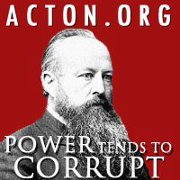
It’s almost 9:00 p.m. and the end of a very long day here at the Acton Institute. Long day but a great day.
The day began with a wonderful discussion over breakfast with a couple of Orthodox priests, a Roman Catholic Priest, and a Methodist minister. I am always amazed at the sessions between the sessions that happen at these types of gatherings. We spoke about the need for us to get back to basics and talk about personhood. We tend to gravitate to the end of the issue and look at things backward, from the problem to the solution. If we start from the definition of personhood, the rest will simply take care of itself.
When a person comes to Acton for the first time, it is suggested that the participants take four foundational courses before all of the others. Christian Anthropology, Christian Vision of Government, Economic Way of Thinking, and the Biblical Foundations of Freedom. The idea being that these foundation courses will assist in understanding the others that follow.
Christian Anthropology
Start with an understanding of what an embodied person is. The human person, from the moment of conception until natural death, is a seamless amalgam of materiality and moral-spiritual qualities.
Any discussion of anthropology has to include a discussion about the fallen nature of humanity. There is a radical disorder that runs through the core of every persons human existence and this has immense implications for the social order. It rules out utopianism and produces the attitude of Christian realism.
We ended the discussion with the individual and the social. Humans are social by nature. We are individuals, in the sense that we are unique and unrepeatable, but we are also social beings in the way that no other animal is.
The Christian Vision of Government
There are nine truths to the Christian Vision of Government
1. The State is not Divine – Christians regard the state as custodian of social order.
2. Human Freedom – God made us free and the ordering of the state should recognize this reality.
3. Reality of Sin – Humans are good but fallen
4. Family – The family is the fundamental unit of society. The family is a natural community and a pre-political unit. It is not merely a construct of society but reflects the social nature of the human person and is a reflection of the Holy Trinity.
5. Justice and Natural Law – Natural law makes it evident that some things are intrinsically evil.
6. Private Property – Private property is not an absolute right like the right to life. Property is deeply connected to the family because it helps create the space and opportunity for families to live out their freedom and responsibilities. The right to own private property is in many ways the material foundation of freedom.
7. Free Association – The right to free association derives from the social nature of man.
8. Free Exchange – People should have the right to buy and sell without undue burden or confiscation of profits.
9. Anti-Utopian – It is not the task of the state to create mankind’s happiness, nor is it the task of the state to create new men.
This part of the lecture ended with a discussion about solidarity and subsidiarity but that needs more thought before I attempt to write about it.
As the day progressed I was a little more tired and so was really not paying real close attention to the last two lectures of the day.
The Economic Way of Thinking
Economics has never really been my thing. I have an undergraduate degree in business and economics was part of the program. This brought back all those bad times I had studying it all those years ago. I admit I need to get over that and do a little more reading in this area. The lecture was very well planned and thought out just not my thing.
Biblical Foundations of Freedom
The last lecture of the day was on the Biblical Foundations of Freedom. Acton was founded by a Roman Catholic priest mainly to teach economic principals to Catholic priests. This lecture was given by the Associate Professor of Church History at the Assemblies of God Theological Seminary.
He walked us through a few Scripture passages that deal with freedom:
Genesis 1-2
Ephesians 2:10
Genesis 3-11
Psalms 90-105
Three keys to the future
Trinity Life and a free and virtuous society
1. Love: Agape, rooted in Divine Self-donation that is sacrificial, substantive and wise.
2. Holiness: Living for the glory of God and the good of others.
3. Unity: finding the deepest values that unite thoughtful and virtuous people of all faiths or none.
All in all it was a good day. My head hurts and I need to process all of it, and I have two more days just as full!
I am glad I will have 12 hours in the car on the way home to really think about all of this.

1 Comment
Comments are closed.